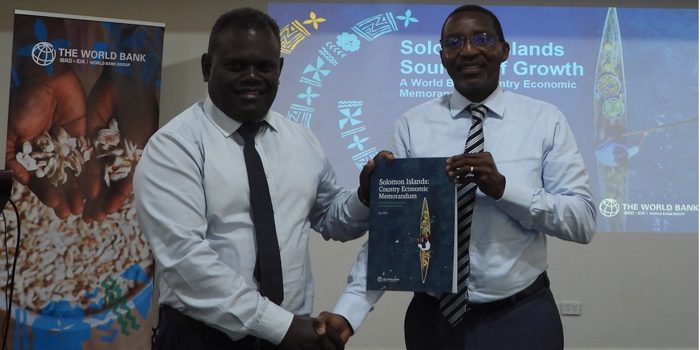THE newly launched World Bank report suggests that modernizing the agricultural sector, combined with initiatives to raise aspirations, could lead to significant economic growth for the Solomon Islands.
The report titled Solomon Islands: Country Economic Memorandum (CEM) – Unlocking New Sources of Economic Growth, examines key barriers to sustainable economic development, with a focus on the challenges of economic geography and private sector development.
The CEM, conducted from February 2023 to March 2024, also analyzes constraints in sectors with high growth potential, such as agriculture, fisheries, tourism, and labor mobility. It provides actionable policy recommendations to help address these barriers and unlock new sources of growth.
One of the report’s key findings is that smallholders currently rely on basic farming tools, which demotivates workers and makes their tasks laborious.
The report emphasizes that “context-specific mechanization, modern production technologies, and cost-effective measures to raise aspirations could significantly increase both productivity and motivation.”
Estimates suggest that these improvements could contribute to a 4.3% increase in GDP. The report also advocates for the private sector to take the lead in modernizing agriculture, supported by appropriate public investment.
With the expansion of digital connectivity, the report highlights the potential for Information and Communications Technology (ICT) to play a more active role in technology adoption. ICT could improve decision-making, reduce information gaps, and help address financial constraints. To truly transform the agricultural sector, both public and private investments must increase.
The report identifies several opportunities to expand production in the primary sector. With large yield gaps, there is significant potential to boost domestic agricultural supply, increase consumer surplus, and create more export opportunities. Beyond existing export commodities, the report suggests that import substitution could benefit the domestic market, particularly in sectors like poultry.
Considering Solomon Islands’ economic geography, the report also highlights the potential for downstream processing to add value to perishable goods and export crops.
Additionally, the re-development of vanilla farming, especially in the favorable climate of the Guadalcanal Plains, is mentioned as a promising opportunity. The report also suggests exploring other high-value spices such as nutmeg.
The Ministry of Agriculture and Livestock (MAL) is aware of the challenges facing the sector. In October 2021, former Prime Minister Manasseh Sogavare launched the Agriculture Sector Growth Strategy and Investment Plan (ASGSIP) 2021-2030, the first agriculture blueprint of its kind for the Solomon Islands.
This 10-year strategy aims to revitalize, modernize, and commercialize the agricultural sector, contributing to the well-being of all Solomon Islanders by ensuring food and nutrition security while promoting economic growth.
The MAL Minister Franklyn Derek Wasi has also outlined several priorities for the sector, which include:
1. Enhanced support for smallholder farmers;
2. Re-establishing the national agriculture research center to support research and development;
3. Promoting smart agriculture to enhance climate resilience and adaptation;
4. Expanding market access and value addition;
5. Capacity building and reviving extension services;
6. Encouraging public-private partnerships;
7. Supporting commercial farmers;
8. Reintroducing farm cooperatives to scale up export volumes;
9. Improving infrastructure for agriculture; and
10. Supporting profitable agribusiness entrepreneurship.
These initiatives collectively aim to position the agriculture sector as a driver of sustainable economic growth and improved livelihoods in Solomon Islands.
By EDDIE OSIFELO
Solomon Star, Honiara









